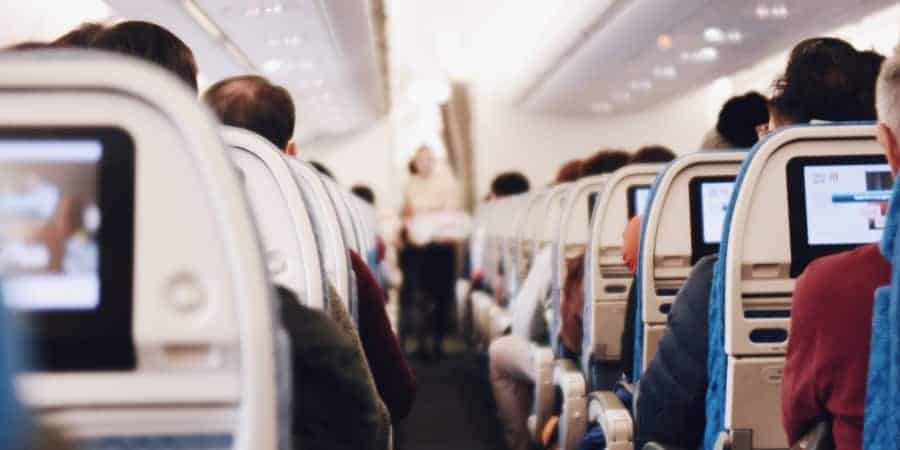The air travel industry emits more CO2 than all but the six most polluting countries in the world. Ryanair is one of the top ten most carbon polluting businesses, but it’s not much of an outlier in the industry. Add to this the fact that other pollutants caused by the industry push the overall impact up by a factor of four or more.
The bottom line is that flying pollutes – and it pollutes a LOT. It’s bad already, and the trend is toward more pollution, not less.

So what can we do? Can we really expect companies to take steps that will potentially reduce profits, even if it does mean benefits to the environment?
Well, yes, it appears we can.
KLM chief executive Pieter Elbers cited keeping licences to operate as the biggest challenge facing the industry today. He suggested that, just as airlines currently share safety information in a non-competitive manner for the good of all passengers, they should do the same with environmentally-friendly technologies and practices, including promoting more responsible business travel choices on the part of their customers.
These more responsible choices would include reducing face-to-face meetings, using alternate modes of travel, such as trains, when such meetings are deemed necessary, and offsetting carbon emissions through other efforts.
In short, the chief executive of KLM is joining those who are asking people to fly less.
Make your business travel more sustainable
Even if the majority of airlines are still not taking big steps toward environmental responsibility, there are steps that you can take, as an individual or as a company, that can help reduce the impact caused by your business travel. Here are a few of the best ones.
Use the internet when practical
Promote the use of Skype, FaceTime, WhatsApp Video calling, and other meeting software. If you can arrange for meetings using these technologies, rather than face-to-face meetings requiring travel, you will reduce your carbon footprint by a lot.
You may need to be there in person for very important negotiations or to make initial contact with an important client, but once the contract is in the bag, things are flowing well, and some trust is built up, consider replacing a few of your meetings with online versions. You might even want to meet online a bit more often to compensate for not making the trip.
Many clients, once they know why you are promoting online meetings, will see it as a positive. After all, it can save them substantial money as well.

Take the train for shorter trips
When you do want to be there in person, and the location is close enough, take the train for more responsible business travel. There are a lot of additional benefits too.
Security is faster, so though the trip itself may take a bit longer, once you take away the distant parking, long lines, security protocols and boarding procedures, it can even out pretty quickly. Rather than going through all of that, you’ll be seated comfortably, in a roomier seat, at a table, working away, or catching up on your Netflix favourites.
There will be fewer interruptions to your Wi-Fi service, and the station of arrival is usually closer to your final destination than the local airport will be.
Train journeys under four or five hours is a great option to flying.
Book with environmentally-conscious airlines
There are some airlines that are working hard to reduce negative impact on the planet, and we think they deserve our consideration and our business.
Look for airlines that have single-use plastic reduction programs, recycling and smart-packaging options, and have a good track record of using planes that suit the passenger load, so they aren’t flying larger planes with many empty seats when they could be using smaller ones to capacity.
A few examples are TUI Airways, LATAM and, perhaps surprisingly, Ryanair.

Take longer holidays – less often
Weekend mini-breaks are a lot of fun, but that fun doesn’t require a flight. Take your short breaks to a more local hotspot, and save up your air travel for times when you can splash out on a holiday of at least a week or two. By doing so, you’ll get more ‘away time’ per flight than if you did a couple of shorter trips.
Added benefits include the quality of the holiday itself. You’ll be able to relax a bit more, see more of the area, and get a higher quality experience of the local customs, food, and everyday lifestyle.
Fly direct
Taking off and gaining altitude both use a lot more fuel than cruising. Once the plane is at cruising altitude, it is in thinner air and is more efficient. The descent is efficient too, as it uses the energy of position – the altitude – to allow a near-glide down to landing level.
If you can fly direct, you eliminate unnecessary stops, take-offs, and ascensions. Over the journey as a whole, this reduces a lot of pollution.

Fly economy
Were you surprised that Ryanair made the list of major polluters AND the list of environmentally-conscious airlines? Well here is why: A smaller amount of space, per passenger, means less environmental impact per passenger.
Therefore budget airlines, which pack in as many people as they can into as small a space as possible, and keep planes at or near capacity for all flights, wind up minimising their carbon output per passenger.
As a passenger, you have little control over airline plane choices, or efficiency of filling them – but you can choose to fly economy. It uses less space than the higher classes, and therefore requires less fuel to carry you and your seat to your destination.
Personal responsibility
You can’t often choose for others to fly more responsibly, but you can choose where to invest your time and money as an individual, or as a company. A few little tweaks can make a big difference over time, and that means something. It says something about you and your company.
It might even win you more business.
You may also like the following articles:






